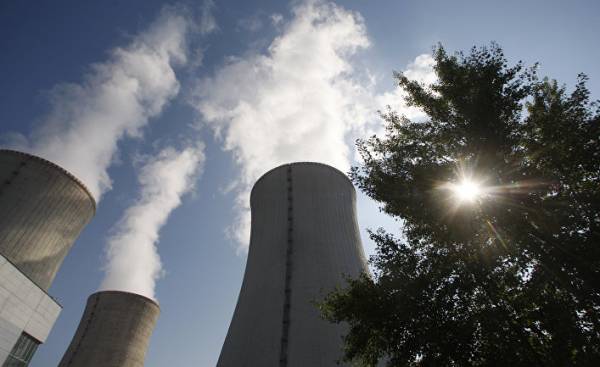
The energy market in Europe is undergoing a radical transformation under the influence of powerful forces, but governments and companies can’t adapt to a changing world. And some of the most significant risks relate to the nuclear sector. The magnitude of this problem indicates that effective solutions can develop only together, but can the Nations of Europe emerging from Brakcet on the collaboration needed to solve it?
In this case we are talking about the action of three factors:
1. Rapidly declining marginal cost of renewable energy (solar and wind) threatens the economies based on nuclear energy and fossil energy, and destroys the business model of traditional power systems.
2. The increasing openness of the European energy market leads to the fact that decisions taken in one country, immediately affect other countries. This increases pressure on the business model of energy supply systems.
3. A whole generation of nuclear power plants built in the 1960s and 1970s, the years are gradually approaching the end of life. These stations will need to be safely decommissioned, and in some cases to replace on new through huge expenses. Currently, the Arsenal of technology the withdrawal of nuclear power plants out of operation is extremely limited. In addition, there is still no standardized and available models for the establishment of new nuclear capacity, or its integration into such a system, in which the role of renewable energy sources will eventually grow.
The reaction of the common challenges and problems remains fragmented and uncoordinated.
Over the next 10 years, France will have to begin the process of decommissioning and replacing their cheap, but an aging nuclear reactors. The estimated cost of decommissioning is usually underestimated, but now we are talking about that at 58 stations will spend about 54 billion euros, of which 23 billion euros will be deferred to the state of the company-operator of nuclear power stations EDF. However, these calculations were not taken into account the statement of the French regulator in the field of treatment and disposal of radioactive waste that only the implementation of the project Cigeo (geological radioactive waste repository) will cost 25 billion euros.
The basis of the replacement plan is the technology of the European EPR reactor is a giant reactor with a capacity of 2,300 MW, which have yet to prove their technological and economic viability. The problem with nuclear power plants, “Haubourdin”, where the first EPR reactor spent much more time and money than originally planned, was never solved, and time of construction is now moved to 2020. Commitment to the idea of building a giant EPR prevents to realize the fact that economy often oppose large-scale projects involving huge investments. Economies need a more simple reactors, such as Atmea capacity of 1100 megawatts, or even smaller power generators with a capacity of approximately 200 megawatts, if we want nuclear power has maintained its competitiveness that it would continue to exist along with other types of energy, and that the reactors could with relative ease put out of operation.
Germany pledged to close the rest of its territory of nuclear power plants by the beginning of 2020-ies. The share of renewable energy in recent years has increased, but fossil fuels, primarily coal, still accounts for a very significant portion of energy produced in the country. Even considering the rapid progress in storage technologies and energy efficiency Germany is unlikely to be able to do without electricity derived from coal, natural gas, and nuclear reactors. Germany has allocated 38 billion euros for decommissioning 17 reactors and has developed a scheme through which the state and energy companies will be able to share among themselves the costs. However, the Arsenal of innovation, know-how and technology of decommissioning remains extremely limited.
Currently, the United Kingdom continues to promote the idea of building new nuclear power stations as part of its strategy of low-carbon energy, but now there are more concerns about cost, competitiveness and sources of funding given the weakness of such companies as EDF and Toshiba, so are considered including alternative energy sources. In addition, the decommissioning of British nuclear power stations built 40-50 years ago, entails a lot of unresolved financial and technical issues. Current estimates of the Department for decommissioning of nuclear facilities in the UK, the cost of this process can be 117 billion pounds.
Eastern Europe is also faced with the need to decommission their nuclear reactors built in the era of the Soviet Union. If the state Treasury does not have enough funds for the withdrawal of reactor decommissioning and disposal of radioactive waste, the financial burden will inevitably fall on the shoulders of the wealthier members of the European Union.
To solve all these issues required a level of cooperation between the European States that would go far beyond current plans to create an “energy Union”, developed by the European Commission. The published figures indicate the magnitude of the problem, however, given the experience and history of nuclear energy, the final figures are likely to be much higher — including due to the lack of definitively agreed standards of output reactors out of operation. In addition, it is unclear who exactly will do this work. The experience of Europe in the output of nuclear reactors out of service is minimal, technological innovation almost no, and the delay in creating a base of proven skills will only increase costs. Given the situation, most of the work at the conclusion of the reactors out of operation will have to comply with non-European companies.
It is clear that taxpayers and consumers have to pay for it all. Those companies that are somehow connected with these processes — from the German energy companies to French suppliers simply do not have at their disposal the necessary amount of money to take on such expenses. As a rule, they have insufficient working capital, have low profitability and low credit ratings. And their position will be even weaker given the changes that occur in the market.
The current status quo will not work to save for a long time. The aging station, you can’t just close and forget, because the risks are too high. Excessive hope on overly expensive technologies that are very difficult to start the work, in particular to the EPR reactors, will soon force governments and consumers to choose alternative technologies. In the absence of clear decisions regarding smaller reactors of the next generation of stations will be built by non-European companies, as Russia, Korea and China will strengthen their dominant position in the global nuclear power industry.
The only way out is concerted action. Remember how European countries have come together to save the aviation industry, and created EADS/Airbus. The objective should be to create a number of new and viable enterprises which will be engaged in withdrawal of the reactors out of operation and the development of a new generation of reactors that can be integrated into the system, where the role of renewable energy sources continues to grow. In parallel, the government should create funds for the implementation of the agreed programme for the withdrawal of the reactors out of operation in accordance with strict standards. This can only be achieved through cooperation between the state and private companies.
Such a strategy should underpin the collaborative efforts of France, Germany and the United Kingdom, but Brakcet, in particular British exit from the European Agency “Euratom”, seriously complicated the process of implementation of this initiative.
However, Pexit does not affect the reality and the magnitude of the problem, so it should not stand in the way of cooperation between European countries. You need to create a coalition of interested countries that must first conduct a full and transparent assessment of the true cost of output reactors out of operation in each country, and assess the adequacy of existing facilities and plans. In parallel, it is necessary to assess the feasibility and cost effectiveness of existing technologies, to ensure that they meet the needs of countries wishing or needing to update their nuclear sectors.
You then need to create new businesses, which can have both public and private shareholders, but should not be subjected to constant political interference. Their main task should be to develop technologies and skills of safe and effective withdrawal process of reactor operation and the development of new generation reactors that are appropriate for energy markets where renewable energies will eventually occupy a dominant position. It also gives Europe a huge global economic opportunity. Even with the possible extension of the service life at least half of those 440 reactors, which are now operating in the world, you will need to retire and may be replaced in the next 20 years. This work can cost many billions of Euro.
This prize is very valuable. However, to win him, we must admit that the current status quo won’t last long, that the issue of removing the reactor from service you can not endlessly put under the carpet and that if we want to maintain European nuclear power, the need to adapt to new economic realities.
It is time to take decisive action. Those companies which are working in the field of nuclear energy, as well as stakeholders such changes will bring a lot of inconvenience. Brakcet complicate the process of developing joint solutions. But those who are responsible for making such decisions, we must recognize that change is urgently needed.
Nick Butler is visiting Professor and Chairman of King’s Policy Institute at king’s College London. He spent 29 years at BP, where from 2002 to 2006 he held the position of Vice President for strategy and policy development. In the past he was also a senior Advisor to the British Prime Minister, Chairman of the Centre for European reform and Treasurer of the Fabian Society. Currently, he is an investor and Advisor of several companies and institutions working in the field of energy.







